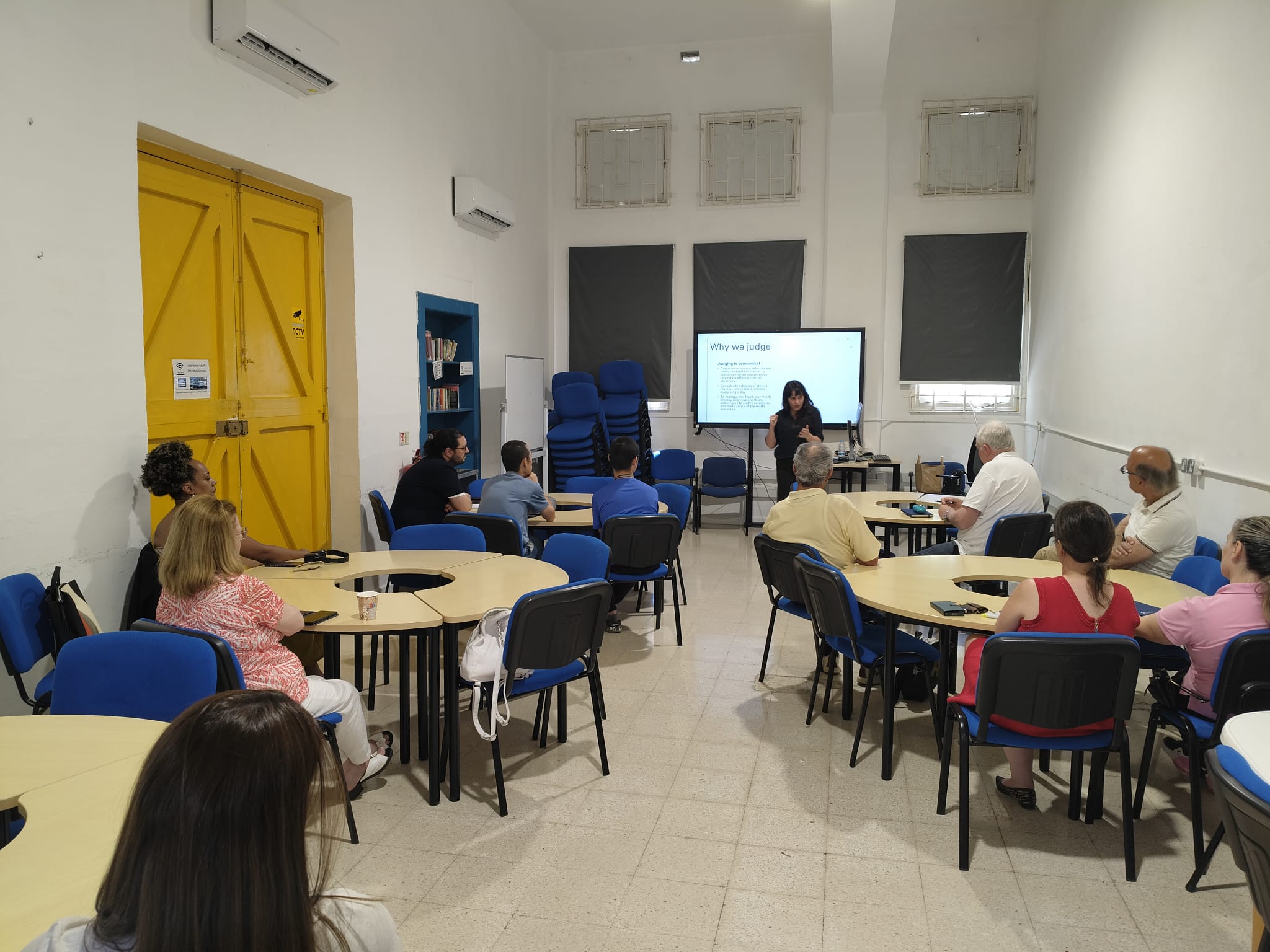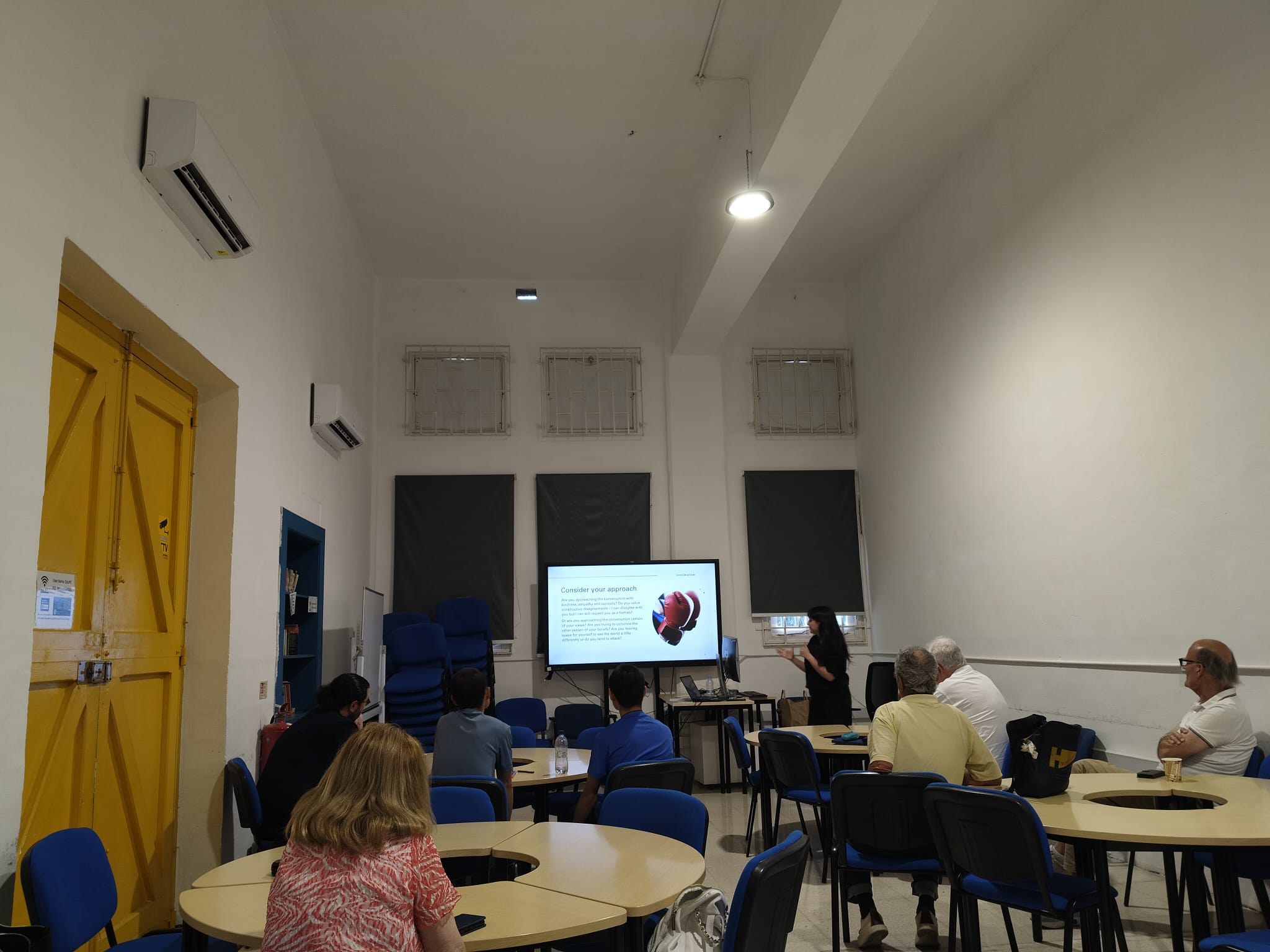ACE 3:Curiosity Over Judgment – A Compassionate Lens on Life
During the Lifelong Learning Open Day on the 31st of May, attendees had the opportunity to participate in two ACE sessions, one of which was led by Svetlana Gatt, a systemic family psychotherapist with a wealth of experience in the mental health field. Her talk, titled ‘Curiosity Not Judgement,’ offered a deeply insightful and humanistic approach to understanding others, and ourselves, through the lens of empathy, awareness, and inquiry rather than quick conclusions.
Why Do We Judge?
Ms Gatt opened her session by exploring why humans are so prone to judgment. At the core of this tendency lies a concept known as cognitive economy; our brain’s instinctive drive to conserve mental energy. We face an overwhelming flood of stimuli daily, and to manage this, our minds create shortcuts, or heuristics. These allow us to make swift judgments and categorise experiences or people quickly. While this is efficient, it often results in oversimplification and misinterpretation.
Our judgments are shaped not just by our personal experiences, but also by deeply embedded cultural norms, societal expectations, and historical context. Ms Gatt used relatable examples, such as differing views on punctuality or beauty across cultures, to illustrate how assumptions can cloud our understanding of others. Judgments, she argued, often stem from our own life stories; stories that may ignore the layers of privilege or hardship others carry.

Privilege and Perspective
In a powerful section of her talk, Ms Gatt invited participants to reflect on their own backgrounds through a set of provocative questions. Have you ever had to fear sexual assault on your way home from work? Do you need to check if a venue is wheelchair accessible before attending? Did you attend private school? This reflective exercise underscored the concept of intersectionality, the idea that various forms of discrimination, based on gender, race, class, ability, or sexuality, intersect in complex ways.
Ms Gatt also introduced an interactive activity called ‘Buy Your Privilege,’ where attendees imagined they had a set amount of money and had to purchase privileges like living in a safe neighborhood or not being judged for their appearance. The exercise illuminated how much we often take for granted and how uneven the starting line of life can be.
From Judging to Wondering
The antidote to judgment, Ms Gatt proposed, is curiosity. She encouraged participants to reframe their internal dialogue when confronted with someone’s behaviour. Rather than thinking ‘Mandy is just mean’ or ‘Alex is too emotional,’ consider what might lie beneath the surface: trauma, chronic pain, anxiety, financial stress or societal marginalisation. This shift requires effort but can lead to much deeper human connection and understanding.
Ms Gatt asked attendees to give their curiosity a ‘shape or character,’ turning it into a tangible mindset that poses gentle questions: What am I missing? What matters to this person? What might they be afraid of?
Judging Actions, Not People
Importantly, Ms Gatt differentiated between judging people and judging actions. Drawing a comparison to the justice system, she reminded the audience that good judges focus on facts, listen carefully and separate actions from the individual. While it’s valid to critique harmful behaviour, we should strive to avoid defining a person solely by a single act or belief.
This nuanced approach allows for both accountability and compassion; a balance especially needed in today’s polarised world.
Letting Go of Judgment
Although judging can sometimes feel gratifying, Ms Gatt invited participants to ask themselves if it truly leads to happiness. Does gossip or criticism create deeper relationships, or does it lead to a culture of fear and insecurity? In contrast, choosing curiosity requires empathy and mutual respect, even in disagreement. As Ms Gatt pointed out, it is entirely possible to disagree with someone and still respect them as a human being.
She posed one final reflection: What might it be like to walk alongside others with all their imperfections, even as they try to change?

A Call to Empathy
Svetlana Gatt’s session was an invitation to pause, ask, and truly see the people around us. Whether it’s remembering to use someone’s preferred pronouns, listening without the urge to fix, or recognising when our assumptions are rooted in privilege, the challenge is to choose compassion over certainty and curiosity over judgment.
In a world increasingly marked by division, this message couldn’t be more timely. Through her talk, Ms Gatt offered not just insight but a roadmap for more humane and mindful living.




